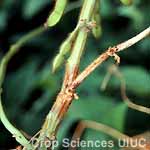Stem Canker

Symptoms:
- Initial symptoms are reddish brown, slightly sunken lesions that appear at the base of branches or leaf petioles.
- These lesions can develop into elongated, sunken, dark brown cankers.
- Brown discoloration may also occur inside the stem.
- Plant parts above the lesions may die.
- Leaves may develop necrosis and chlorosis between the veins, and may remain attached after death.
- Lesions may be found at the soil line, making it easy to confuse this disease with Phytophthora rot.
- Stem canker does not cause root rot, while Phythophthora rot causes root rot.
- Tiny black dots may appear on the stem singly or in clustered groups on plants killed by stem canker.
Pathogen Involved:
- Diaporthe phaseolorum var. caulivora, a fungus that causes northern stem canker.
- Diaporthe phaseolorum var. merdionalis, a fungus that causes southern stem canker.
- These pathogens overwinter in infested soybean residue, and may be spread with infected seed.
Time of Occurrence:
- Mid-July to maturity.
Conditions Favoring Disease:
- Prolonged wet weather, especially early in the season.
- Conservation tillage.
- Yield losses can be significant.
Disease Management:
- plant resistant or moderately resistant varieties
- delayed planting may be beneficial
- foliar fungicides may be beneficial
- tillage can reduce disease problems in fields where stem canker has been a problem